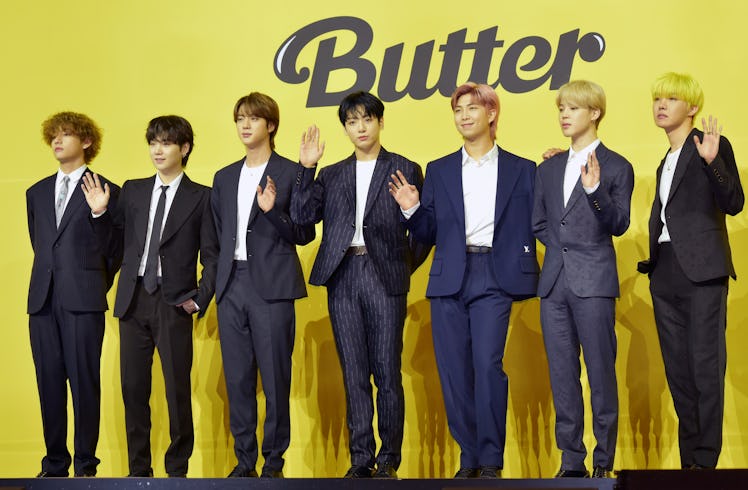
BTS Shut Down Chart Manipulation Accusations With 1 Simple Truth
Should they have to apologize for having loyal fans?
Few bands have seen as much commercial success as BTS, which is why their consistently impressive sales numbers haven’t come without skepticism. BTS has experienced some backlash online over their chart gains, with critics going as far as accusing their fans of manipulating music charts by teaming up to buy their music in bulk. However, the K-Pop superstars want critics to know they value transparency and honesty in their accomplishments — and that fan loyalty is not anything to be ashamed of. BTS' response to chart manipulation accusations was crystal clear.
A quick look at BTS’ chart placements over the last few years reveals an impressive track record. The band broke the record for the most weeks spent at No. 1 on Billboard's Digital Song Sales chart with their smash “Dynamite.” Their fourth No. 1 hit on the Billboard Hot 100 chart, “Butter,” stayed strong at No. 1 for nine non-consecutive weeks.
The stats are impressive, yes, and Billboard revealed the band pushed a lot of sales to lock down those coveted spots. While most artists snag No. 1 spots through radio airplay and streams, BTS landed themselves there thanks in large part to physical and digital sales. (It should be noted that although their streaming and radio impact is weaker than typical Billboard No. 1 artists in 2021, their hits were not flops on any medium. “Butter” hit the Top 20 on Billboard’s radio play charts and broke first-day Spotify streaming records.) But seeing as the always-dedicated BTS ARMY organizes mass purchases of the band’s music, the validity of their chart placement is sometimes called into question by critics.
In a new cover story for Billboard, BTS’ RM spoke out about accusations that their fans buying their music in droves amounts to cheating. “It's a fair question," RM told Billboard. “But if there is a conversation inside Billboard about what being No. 1 should represent, then it's up to them to change the rules and make streaming weigh more on the ranking."
RM said he doesn’t believe BTS should be punished for having a hyper-loyal fanbase. "Slamming us or our fans for getting to No. 1 with physical sales and downloads, I don't know if that's right,” he said. “It just feels like we're easy targets because we're a boy band, a K-pop act, and we have this high fan loyalty."
The president of Big Hit Music, Shin Young-Jae, also spoke out against the claims. “Wouldn't it be nice if we actually had the ability to mastermind such a thing?" Shin told Billboard.
Billboard’s chart criteria has come into question in recent years, especially after many artists utilized “bundling” (the practice of giving away free digital albums with merch and concert tickets to increase sales numbers) to snag No. 1 albums. As of July 2020, Billboard has all but eliminated bundling from counting on the chart, so that definitely isn’t the reason for BTS’ consistent chart placement (not to mention, even when bundling was allowed, BTS did not employ the tactic).
Considering the mechanisms that dictate streaming and radio numbers are shrouded in mystery, the concentrated criticism surrounding BTS’ sales may be unwarranted. While there’s heavy scrutiny of BTS’ fans for bulk buying their music, much less attention is given to concerns over how airplay and streaming numbers are tabulated on the charts. With a well-documented history of labels buying radio hits and recent criticism surrounding who gets placement at the top of leading streaming services’ most popular curated playlists (not to mention ARMYs’ concerns with how BTS’ streams are filtered compared to other artists’), RM’s point about the disproportionate criticism being lobbed at BTS seems fair.
At the end of the day, few fanbases are as loyal as the BTS ARMY, and their success can be credited to that.